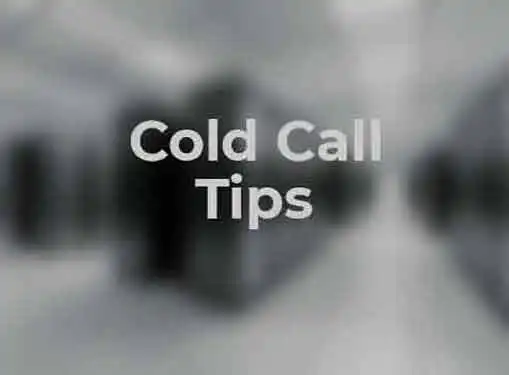Entrepreneurial Selling
Cold Call Tips
Written by Celeste Heiter for Gaebler Ventures
Anyone who's ever made a cold call knows how frustrating it can be. These 10 cold-calling strategies will help you get your foot in the door.
Cold call. Even the words have a chilling effect.

No wonder nobody wants to do it. But regardless of what you're selling, whether it's a product, a service, a business deal, or even yourself in a quest for a new job, chances are, you're going to have to make a few cold calls. The good news is that there are ways to warm up the process. Implement them and watch your efforts catch fire.
Identify Your Target Market: The most important first step for any business transaction is identifying your target market, and this is especially true of cold calling. Why waste your pitch on a company that is too big, too small, or has no need for what you have to offer? Do your homework. Research your prospects to ensure that they are a good fit and will be receptive to your call.
Prioritize Your Prospects: In creating your target list, you will probably have a hunch that some of your prospects are better than others. And although your initial impulse may be to call on them first, that's the biggest mistake you could make. Never call your best prospect first. Instead, prioritize your target list from least likely to most likely, so that you will have time to hone your pitch and practice answering unanticipated questions.
Define Your Purpose: Before making your first call, ask yourself this: Why am I making cold calls? If your answer is because you were assigned to the task, or because you're desperate for new business, you need to give some thought to the real purpose of cold calling. Why cold calling instead of some other method? How does cold calling further my business objectives? How can I spin cold calling to my advantage?
Set Realistic Goals: When making cold calls, keep in mind that you're probably not going to make a sale or sign a client over the phone. What you want is an appointment to meet with a decision-maker to make your presentation. So for each cold-calling session, set a quota for yourself. Calculate a realistic estimate of how many calls you will be able to make, or how many appointments you will successfully schedule, and don't quit until you have made them all.
Get the Creative Juices Flowing: Research both your target companies and your competitors with the goal of discovering a niche market, filling a special need, or developing a new service or product that will give you an edge. Then include this specialty in your cold call and use it to get yourself in the door.
Create a Road Map: Before making your first cold call, compose three scripts: one for a voicemail recording, one for the gatekeeper, and one for the decision-maker. Practice each one a few times, keeping in mind that your "script" should sound natural rather than rehearsed. If it helps, you can use a voice recorder to critique yourself and make improvements.
Put Your Best Foot Forward: Choose a quiet place, and a time when you will not be interrupted. Set up the resources you will need, including a pen and paper, your day-planner, and any relevant reference materials. Use a wireless headset or a cordless phone so that you can move about freely in the event that you need to go get something. Never put your prospect on hold, and if your cell phone often drops calls, then don't use it.
Ask Leading Questions: Never ask a question that can be answered with a simple "No." Always phrase your questions in a thought-provoking way to elicit an interactive answer.
Take Notes: Keep a call journal with a separate entry for each prospect. Throughout the course of your conversations, jot down any pertinent information, the names of additional contacts, and the outcome of each call. Also include any mistakes you made or obstacles you encountered so that you can improve your pitch for later calls.
Go For the Gold: When you sense that the conversation may be coming to close, suggest a specific day and time for a meeting. If the time you suggest is not convenient for your prospect, ask when a convenient time would be, or suggest other times that you have available. Never ask for an appointment in a way that can be answered with a simple "No."
Celeste Heiter is an entrepreneur and professional writer. She has owned several businesses, is a graphic designer and an expert on Japan and its culture. Today Celeste devotes her time to writing about a variety of business topics.
Share this article
Additional Resources for Entrepreneurs



Conversation Board
We greatly appreciate any advice you can provide on this topic. Please contribute your insights on this topic so others can benefit.